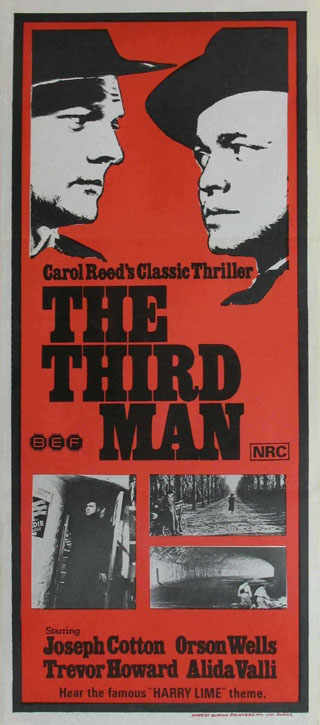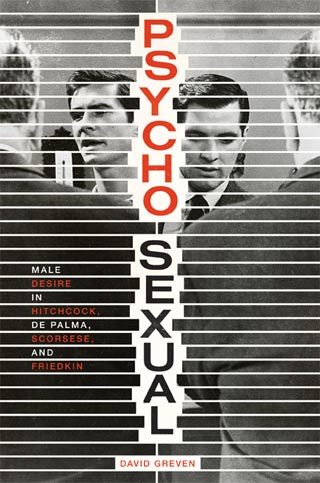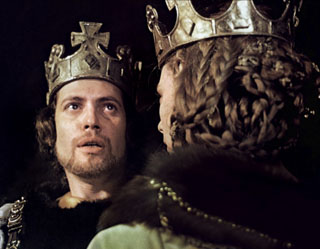“I’ve decided to retire some of the lectures I take on the road, and I’ll put them up as video lectures,” announces David Bordwell. The first he’s posted, “How Motion Pictures Became the Movies,” runs just over an hour.
“After one year and 102 blog posts containing a collective 125,000 words, our Still Dots project was complete,” write Matt Levine and Jeremy Meckler at the Walker Art Center. “Since December 13, 2011, we’d been pulling one frame from every 62 seconds of screen time in Carol Reed‘s remarkable film The Third Man and, twice per week, writing an in-depth analysis of it…. Our analyses related to specific frames, either discussing the narrative or characters at that particular point in the film’s chronology, dissecting the mysterious visual factors that conspire to create The Third Man‘s shadowy environs, or taking wild flights of fancy based on the particularities of that frozen moment. Through our project we tied in serious thinkers and authors (from Freud to Marx, Sontag to Dostoyevsky, Einstein to Eisenstein), various films (anything from The War Game to Star Wars), and other aspects of contemporary culture (superhero comics, Looney Tunes, Mad Men, and The Wire), to name a few. Still Dots was inspired largely by Roland Barthes, who in his famous 1970 essay ‘The Third Meaning‘ considers film stills as separate from both film (since they lack the illusion of movement) and photography (since they are not photographs so much as evidence of that flickering illusion that they constitute).”
Selections from the January/February issue of Film Comment are now online, including “Terra Incognita,” various contributors’ notes on the best unreleased or limited release films of 2012. Nicolas Rapold is hoping that Yesim Ustaoglu’s Araf: Somewhere in Between will find a distributor. David Filipi looks back on the year in animation. Walter Hill remembers the “physically vital, brusque, massive, seething, darkly funny, explosive, direct, and very smart” Robert Aldrich. Nathan Lee on found-footage horror: “The most gimmicky of contemporary genres doggedly persists despite much jumpage of the shark.” Also: Geoffrey O’Brien on Django Unchained, Jesse P. Finnegan on the media-art duo Semiconductor, and around 20 reviews of new theatrical and DVD/Blu-ray releases.
LOLA 3 is now complete, with another round of hailing Leos Carax’s Holy Motors, Adrian Martin on Mehrnaz Saeedvafa’s Jerry and Me (2012, and yes, the Jerry is Lewis), Miguel Marías on “The Disappearance of Jerry Lewis,” Emmanuel Siety on Jacques Rivette and John Carpenter (“Insularities Compared”), and Carles Matamoros‘s report on last fall’s Sitges Film Festival.
Stoffel Debuysere’s translated Jacques Rancière‘s 2007 essay on Pedro Costa and posted a short essay and a collection of quotes and stills from films by Robert Kramer, whose Ice (1970) will screen in the New Yawk New Wave series at Film Forum in New York on January 24 and 25.
By now, you’ll have heard about Stephen Rodrick‘s epic report for the New York Times Magazine on the making of The Canyons, directed by Paul Schrader and written for Bret Easton Ellis. But if you haven’t read it yet, do: “Here Is What Happens When You Cast Lindsay Lohan in Your Movie.”
“There hasn’t been nearly enough critical appreciation for the nature of early talkies and how much they gain in texture from their mechanical handicaps, especially when compared to films made after 1935,” writes Michael Atkinson at Sundance NOW. “Whether you’re looking at Ernst Lubitsch‘s bubbly The Love Parade (1929) or Leontine Sagan’s heartbroken Mädchen in Uniform (1931) or Victor Fleming‘s tough-talking Red Dust (1932), early talkies, regardless of genre, have everything to do with a creaky innocence, a sense of uncertain melodrama, a theatricality that seems closer to a madman’s tiny rubber room than to an actual theater stage, a self-conscious acting style that can border on the deranged, a threatening degree of archival decay, and an aural current marked by fizzes, audible sutures, unearthly pauses and a disconcerting silence devoid of ambient noises. Pre-Code transgressions, like Bellamy’s scene in bridal underwear in White Zombie, are just final dollops of cake icing. Watching early talkies gives you the sense of watching cave paintings, or porcelain nursery objects come jerkily to life.”
“[A]s long as there is cinema, and cinephiles, and cinema historians, The Birth of a Nation will be maybe the greatest ‘problem picture’ of all time.” Glenn Kenny revisits Griffith‘s troublesome landmark.
“East Hastings Pharmacy premiered at the 2012 Cinema du Reel Festival in Paris and has screened widely at festivals, including the Viennale, the Images Festival, RIDM, and the Kasseler Dokfest, where it recently won the festival’s top prize, the Golden Key.” For Cinema Scope, Michael Vass interviews director Antoine Bourges.
And Miranda July interviews Lena Dunham for Interview.
Books. At the House Next Door, Clayton Dillard reviews David Greven’s Psycho-Sexual: Male Desire in Hitchcock, De Palma, Scorsese, and Friedkin, “a provocative monograph that examines often casually dismissed ‘negative’ images of non-normative sexuality, while offering serious reconsideration of not just Hitchcock’s critical legacy as a misogynist filmmaker, but key works within the oeuvres of New Hollywood directors… Greven details how these New Hollywood filmmakers ‘seized upon Hitchcock’s radical decentering of heterosexual male dominance, devising contemporary narratives of heterosexual male ambivalence that allowed for, at time depended on, an investment in same-sex desire as well as an awareness of its dangerous, pernicious seductions.'”
Jon Wiener for the Los Angeles Review of Books on The Noir Forties: The American People from Victory to Cold War: “‘Films noir,’ [Richard] Lingeman declares at the outset, ‘are a key for unlocking the psychology, the national mood during those years.’ But despite its title, The Noir Forties is not a book about the films—for that, readers should turn to J. Hoberman’s recent book An Army of Phantoms: American Movies and the Making of the Cold War, and to the classic More Than Night: Film Noir in its Contexts by James Naremore. Instead, Lingeman’s book provides a broader history of the brief but crucial period when the world of the New Deal died and the iron cage of Cold War politics and culture was forged. It would remain in place for the next 45 years.”
In other news. Today’s announcement from the Berlin International Film Festival: “For the tenth Berlinale Co-Production Market (from February 10 to 12, 2013), 38 new feature-film projects and seven internationally renowned production companies have been selected to meet in Berlin with 450 potential co-production and financing partners…. This year’s selection includes projects by internationally established directors, such as Søren Kragh-Jacobsen, Lucrecia Martel and György Palfy, as well as by filmmakers whose debut films screened successfully in recent years, such as Emin Alper, Phan Dang Di and Asli Özge.” And the directors bringing Berlinale Residency projects are Matías Bize, Raya Martin, Rebecca Daly, Rafi Pitts, and Sacha Polak.
Awards. Ben Affleck and Argo scored at the Broadcast Film Critics Association’s Critics’ Choice Awards last week; the Directors Guild has announced its nominees for Outstanding Directorial Achievement in Documentaries; and the nominations for the ACE Eddie Awards are out.
Chicago. “In a neat coincidence, the restored print of Claude Sautet’s Max et les Ferrailleurs comes into town just after Doc Films started its Louis Malle series, which continues every Tuesday night through mid-March,” writes Ben Sachs in the Reader. “This seems fitting, as the careers of Malle and Sautet overlap in a number of ways. Both had formative experiences as assistant directors; Malle assisted Robert Bresson on A Man Escaped, and Sautet graduated to directing his first crime film, Classe Tous Risques, after assisting on similar features throughout the 1950s. In the 60s both men employed stylistic devices (location shooting, jump cuts, direct sound) as well as actors (Jean-Paul Belmondo, Jeanne Moreau) associated with the French New Wave, though neither considered himself a member of that movement. By the following decade both had settled into relatively conservative modes of filmmaking, privileging character over style and dealing mainly with middle- or upper-class subjects.” And they both fell out of favor among cinephiles, but the “out-of-time quality sometimes ascribed to Sautet and Malle’s 70s work now seems to me like its greatest virtue.”
Obits. “In the 1970s, it seemed a sure bet that the actor Jon Finch, who has died aged 71, would become a durable film star of some magnitude,” writes Ronald Bergan in the Guardian. “He had the dark good looks, the voice, the charisma and the opportunities. At the beginning of his film career, he played the title role in Roman Polanski’s The Tragedy of Macbeth (1971) and starred in Alfred Hitchcock’s Frenzy (1972)…. That Finch never achieved the level of stardom that was anticipated may be attributed to his dislike of the kind of media publicity that goes with it and his self-proclaimed lack of ambition.” Still, despite bouts with illness (he’d been cast, for example, in Ridley Scott’s Alien (1979), but fell ill and was replaced by John Hurt), Finch would go on to turn in powerful performances for the BBC’s Shakespeare History Cycle in the late 70’s and early 80’s.
Evan S. Connell, who has died aged 88, “was best known for his debut novel, Mrs. Bridge (1959), which with its sequel, Mr. Bridge (1969), was made into the Merchant Ivory film Mr. and Mrs. Bridge (1990), starring Paul Newman and Joanne Woodward,” writes Michael Carlson, also in the Guardian. “Son of the Morning Star (1985), Connell’s magnificent study of General Custer’s last stand, was described by the writer Larry McMurtry as ‘one of the few masterpieces to concern itself with the American west.'”
Another recent passing which must be mentioned is that of Aaron Swartz. The brilliant activist helped invent RSS at the age of 14, founded Demand Progress, and was a co-founder of Reddit. But that just scratches the surface. From the official statement from his family: “Aaron’s commitment to social justice was profound, and defined his life. He was instrumental to the defeat of an Internet censorship bill; he fought for a more democratic, open, and accountable political system; and he helped to create, build, and preserve a dizzying range of scholarly projects that extended the scope and accessibility of human knowledge. He used his prodigious skills as a programmer and technologist not to enrich himself but to make the Internet and the world a fairer, better place. His deeply humane writing touched minds and hearts across generations and continents. He earned the friendship of thousands and the respect and support of millions more.” And he was only 26 when he was found dead on Friday. I encourage you to read more about the circumstances of this tragedy in heartfelt appreciations by Lawrence Lessig, Cory Doctorow, Rick Perlstein, and by Caleb Crain, who links to many more. And one more thing. The last two entries Aaron Swartz posted on his blog were about movies, Looper and The Dark Knight.
More browsing? John Wyver has plenty.
For news and tips throughout the day every day, follow @KeyframeDaily on Twitter and/or the RSS feed. Get Keyframe Daily in your inbox by signing in at fandor.com/daily.






